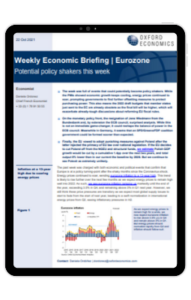Eurozone weekly economic briefing | Potential policy shakers this week

The week was full of events that could potentially become policy shakers. While the PMIs showed economic growth keeps cooling, energy prices continued to soar, prompting governments to find further offsetting measures to protect purchasing power.
What you will learn:
- On the monetary policy front, the resignation of Jens Wiedmann from the Bundesbank and, by extension the ECB council, surprised analysts. While this is not an immediate game-changer, it could reshape the balance of power in the ECB council.
- Meanwhile in Germany, it seems that an SPD/Greens/FDP coalition government could be formed sooner than expected.
- The EU vowed to adopt punishing measures against Poland after the
latter rejected the primacy of EU law over national legislation.
{% video_player “embed_player” overrideable=False, type=’scriptV4′, hide_playlist=True, viral_sharing=False, embed_button=False, autoplay=False, hidden_controls=False, loop=False, muted=False, full_width=False, width=’1920′, height=’1080′, player_id=’58287842917′, style=” %}
Tags:
Related Services

Post
UK: Supply constraints are probably less prominent in the south
The extent to which UK employers can respond to likely 2024 interest rate cuts with increased output, rather than rises in prices and wages, will partly reflect the extent of spare capacity. This will inevitably vary by region. Evidence on this is imperfect, but in terms of capital assets (including intangibles) and labour availability, southern regions appear to be in a stronger position than those in the UK's traditional industrial heartland.
Find Out More
Post
Global Private equity real estate fund maturities spur asset sales
We expect the significant increases in fund maturities, spurred by capital raised over the past decade, to exert upward pressure on the rate of asset disposals as the funds approach the end of their lifecycles.
Find Out More